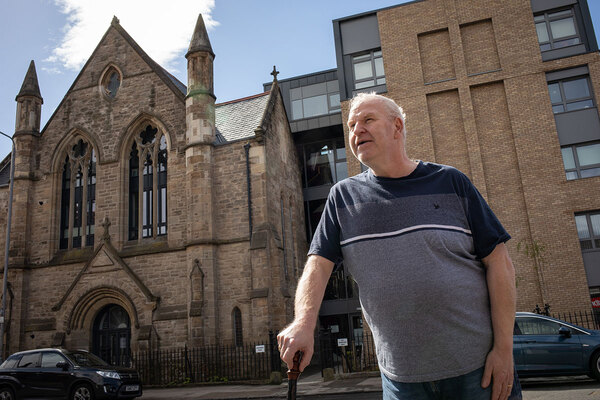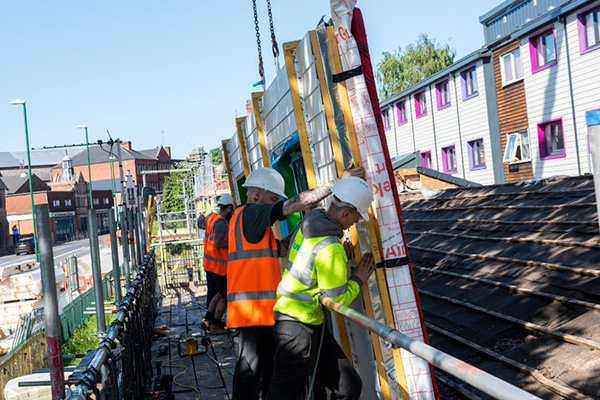
Reaching net zero will require new levels of collaboration
Climate change is the next big challenge for social landlords. Colette McKune argues that the sector must collaborate to achieve what needs to be done
Working individually, every landlord can make a difference in tackling the climate crisis. Working together, we can deliver lasting change that resets how we build and look after homes for generations to come.
Housing providers will be at various stages of drawing up plans to reduce their environmental impact and preparing for the legislative changes and government targets that loom large on the horizon.
“As COP26 approaches later in the year, we can expect proactive announcements that will directly impact tenants and landlords”
Plans to accelerate emission cuts to 78% by 2035 show that the government finally seems serious on the climate emergency.
Gas boilers will be banned from new homes from 2025. As the Climate Change Conference of the Parties (COP26) approaches later in the year, we can expect proactive announcements that will directly impact tenants and landlords.
Potentially, we could end up with plans developed in silos, all pointed at the same targets.
Yes, we will all have different challenges to address dependant on geography, the make-up of home types and planned build programmes. But that doesn’t mean we should all look at net zero targets in isolation.
It is tenants that should sit at the heart of our plans. It is tenants who will be most impacted. These are interventions in their homes. It will be their inconvenience while work is undertaken and the impact upon fuel bills will be borne by them.
“This is our next big test of willingness to collaborate”
It is absolutely vital that we involve and co-produce plans with them. If we don’t, we will fail.
The housing sector is at is best when it is united. And the decarbonisation of people’s homes is something that must bring us together.
If there is one legacy the sector must take from the coronavirus pandemic, it is greater partnership working. This is our next big test of willingness to collaborate.
I was fortunate to recently join the National Housing Federation’s sustainability strategy group, which will be a great forum for setting the sector’s roadmap for reaching net zero targets in 2050. Regionally, I lead Greater Manchester Housing Providers on decarbonisation and I also sit on the Greater Manchester retrofit taskforce.
The theme across all these groups has been familiar: we must get better at sharing data. As a sector we can often be data-rich and information-poor.
There are progressive projects in which property services businesses, manufacturers, housing associations, local authorities and private businesses that are working with academics and universities to find the best solutions for decarbonising homes and retrofitting properties.
These will be important in helping identify which investments will deliver good value and improve people’s lives and, just as crucially, which won’t.
While targets for net zero homes are becoming clearer, how work will be funded isn’t.
At ForHousing, decarbonisation – and especially challenges associated with our existing homes – has been at the forefront of our thinking for some time.
If we are serious about housing’s contribution to a cleaner planet, we must embrace the transition from rhetoric and pledges to meaningful, deliverable strategies and action.
We are committing funds to achieve energy performance certificate (EPC) rating band C in all homes by 2030 and to increasing the energy efficiency of new homes by piloting a fabric-first approach and air-source heat programme to test the impact upon tenants’ fuel bills and reduction in carbon.
This is the sensible and right thing to do for homes, tenants and the environment. It also gives us an opportunity to share data with our partners around the impact of this investment.
“It should not be installing technology that should be the legacy of current housing professionals, but a commitment to positively impacting people’s financial resilience and developing a new generation of leaders that make sustainability a core part of housing’s DNA”
In challenging times, we need to be agile – again another lesson from the pandemic – so as targets change, we will, too.
As funding and timescales become more apparent, we will work with other landlords on joint procurement, training, job creation, tenant engagement and the delivery of investment projects.
We must also be mindful that change, especially on this scale, takes time. It is difficult. It’s a challenge we must think of in terms of generations, rather than years.
The work that we are doing today on sustainability will need to be completed after many of us currently in leadership positions have retired or moved on to new roles.
It should not be installing technology that should be the legacy of current housing professionals, but a commitment to positively impacting people’s financial resilience and developing a new generation of leaders that make sustainability a core part of housing’s DNA.
Colette McKune, chief executive, ForHousing













